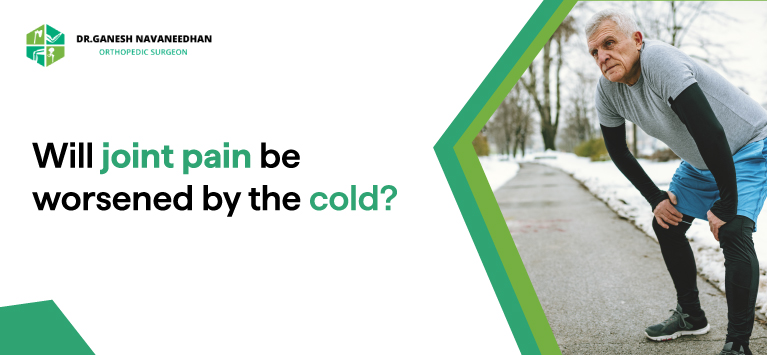- +91 8848509072
-
Sasthamangalam, Trivandrum
Sasthamangalam, Trivandrum

It’s likely that you have started to notice changes in your joints when the weather starts to cool off. In fact, some people assert that they can forecast when it will rain by paying attention to how their joints feel on a certain day. Have you ever wondered why cold weather makes your joints feel the way they do, despite the fact that this is a well-known occurrence?
There are a few aspects given by Dr.Ganesh Navaneethan, a reputed Orthopedic doctor in Trivandrum regarding why your joints alter when the temperature decreases.
The reason for your joint pain during cold weather is listed below:
The fluid that cushions joints is called synovial fluid. Normal synovial fluid has the consistency of egg white in order to promote appropriate and unhindered joint movement. However, synovial fluid hardens and loses some of its ability to flow readily as the temperature drops. Stiffness or “creaky” joints could be the result.
The weight of the air, commonly referred to as barometric pressure or atmospheric pressure, varies with the weather. When it’s warm outside, barometric pressure is high; when it’s chilly outside, it’s low. Joint discomfort might occur as the barometric pressure drops because the tissues in your joint somewhat expand.
People with recent or historical joint injuries are the ones that experience this the most frequently. Inflammation, adhesions, or scarring can also make the nerves more sensitive to cold temperatures. As a result, joint pain develops during cold weather.
Cold temperatures coupled with high humidity levels may also make joints more uncomfortable. Some specialists believe that high humidity harms the cells that make up bone and cartilage, while the exact cause of this is unknown.
Generally speaking, during the colder months, people are less active. Since frequent exercise and stretching are effective treatments for many joint disorders, extended periods of inactivity can exacerbate joint discomfort.
Dr.Ganesh Navaneethan has also given the practices that make your joint pain-free during the cold weather. They are as follows:
If the temperature in your workplace is on the chilly side and you notice that your joints are acting up, carry extra clothing with you to work. When you reach home, take a warm bath or shower, and make sure you have gloves, warm socks, an appropriate coat, and a cap to keep you warm when you have to travel into the bitter cold. For more orthopedic queries, check our page
Copyright © 2024 Dr. Ganesh Navaneedhan. All Rights Reserved. | Designed By Harvee healthcare